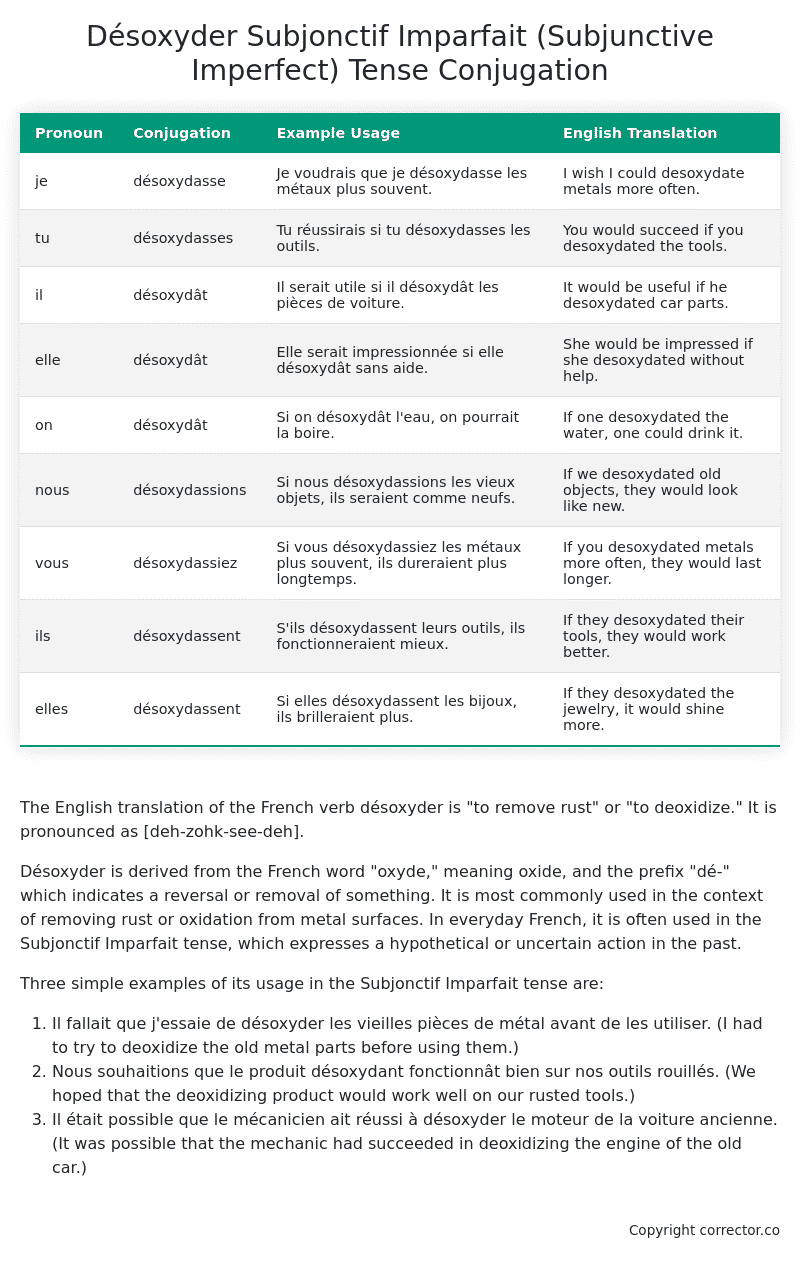Subjonctif Imparfait (Subjunctive Imperfect) Tense Conjugation of the French Verb désoxyder
Introduction to the verb désoxyder
The English translation of the French verb désoxyder is “to remove rust” or “to deoxidize.” It is pronounced as [deh-zohk-see-deh].
Désoxyder is derived from the French word “oxyde,” meaning oxide, and the prefix “dé-” which indicates a reversal or removal of something. It is most commonly used in the context of removing rust or oxidation from metal surfaces. In everyday French, it is often used in the Subjonctif Imparfait tense, which expresses a hypothetical or uncertain action in the past.
Three simple examples of its usage in the Subjonctif Imparfait tense are:
- Il fallait que j’essaie de désoxyder les vieilles pièces de métal avant de les utiliser. (I had to try to deoxidize the old metal parts before using them.)
- Nous souhaitions que le produit désoxydant fonctionnât bien sur nos outils rouillés. (We hoped that the deoxidizing product would work well on our rusted tools.)
- Il était possible que le mécanicien ait réussi à désoxyder le moteur de la voiture ancienne. (It was possible that the mechanic had succeeded in deoxidizing the engine of the old car.)
Table of the Subjonctif Imparfait (Subjunctive Imperfect) Tense Conjugation of désoxyder
| Pronoun | Conjugation | Example Usage | English Translation |
|---|---|---|---|
| je | désoxydasse | Je voudrais que je désoxydasse les métaux plus souvent. | I wish I could desoxydate metals more often. |
| tu | désoxydasses | Tu réussirais si tu désoxydasses les outils. | You would succeed if you desoxydated the tools. |
| il | désoxydât | Il serait utile si il désoxydât les pièces de voiture. | It would be useful if he desoxydated car parts. |
| elle | désoxydât | Elle serait impressionnée si elle désoxydât sans aide. | She would be impressed if she desoxydated without help. |
| on | désoxydât | Si on désoxydât l’eau, on pourrait la boire. | If one desoxydated the water, one could drink it. |
| nous | désoxydassions | Si nous désoxydassions les vieux objets, ils seraient comme neufs. | If we desoxydated old objects, they would look like new. |
| vous | désoxydassiez | Si vous désoxydassiez les métaux plus souvent, ils dureraient plus longtemps. | If you desoxydated metals more often, they would last longer. |
| ils | désoxydassent | S’ils désoxydassent leurs outils, ils fonctionneraient mieux. | If they desoxydated their tools, they would work better. |
| elles | désoxydassent | Si elles désoxydassent les bijoux, ils brilleraient plus. | If they desoxydated the jewelry, it would shine more. |
Other Conjugations for Désoxyder.
Le Present (Present Tense) Conjugation of the French Verb désoxyder
Imparfait (Imperfect) Tense Conjugation of the French Verb désoxyder
Passé Simple (Simple Past) Tense Conjugation of the French Verb désoxyder
Passé Composé (Present Perfect) Tense Conjugation of the French Verb désoxyder
Futur Simple (Simple Future) Tense Conjugation of the French Verb désoxyder
Futur Proche (Near Future) Tense Conjugation of the French Verb désoxyder
Plus-que-parfait (Pluperfect) Tense Conjugation of the French Verb désoxyder
Passé Antérieur (Past Anterior) Tense Conjugation of the French Verb désoxyder
Futur Antérieur (Future Anterior) Tense Conjugation of the French Verb désoxyder
Subjonctif Présent (Subjunctive Present) Tense Conjugation of the French Verb désoxyder
Subjonctif Passé (Subjunctive Past) Tense Conjugation of the French Verb désoxyder
Subjonctif Imparfait (Subjunctive Imperfect) Tense Conjugation of the French Verb désoxyder (this article)
Subjonctif Plus-que-parfait (Subjunctive Pluperfect) Tense Conjugation of the French Verb désoxyder
Conditionnel Présent (Conditional Present) Tense Conjugation of the French Verb désoxyder
Conditionnel Passé (Conditional Past) Tense Conjugation of the French Verb désoxyder
L’impératif Présent (Imperative Present) Tense Conjugation of the French Verb désoxyder
L’infinitif Présent (Infinitive Present) Tense Conjugation of the French Verb désoxyder
Struggling with French verbs or the language in general? Why not use our free French Grammar Checker – no registration required!
Get a FREE Download Study Sheet of this Conjugation 🔥
Simply right click the image below, click “save image” and get your free reference for the désoxyder Subjonctif Imparfait tense conjugation!

Désoxyder – About the French Subjonctif Imparfait (Subjunctive Imperfect) Tense
Formation
Common Everyday Usage Patterns
Interactions with Other Tenses
Subjonctif Présent
Indicatif Passé Composé
Conditional
Conditional Perfect
Summary
I hope you enjoyed this article on the verb désoxyder. Still in a learning mood? Check out another TOTALLY random French verb conjugation!


